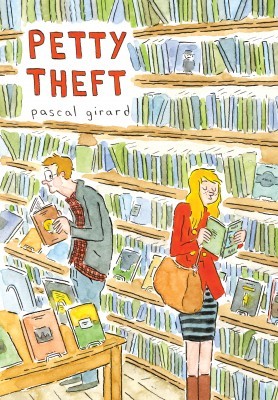Pascal Girard’s Petty Theft is a fictionalized autobiographical account of the author’s surrogate character, also named Pascal, and his increasingly hare-brained schemes to stalk, date, and ultimately confront a cute girl he sees shoplifting a copy of his book. This innocent enough set-up is followed by an escalating series of comedic embarrassments in which Pascal repeatedly says the wrong thing at the wrong time and where everything he does to get out of trouble has precisely the opposite effect. Girard previously mined his self-titled character’s social and romantic awkwardness to great comedic effect in Reunion, a book about a disastrous high school reunion. This time, Pascal’s knowledge that the girl he is romantically pursuing is a shoplifter allows him a measure of detached confidence as he assures himself that he is really only doing “detective work.”
What that means, exactly, is unclear to both Pascal and his friends in the story, who have trouble understanding his strange fascination for solving the “case.” Of course, one explanation is that the girl, Sarah, is cute and that Pascal is flattered by the implicit compliment she paid him when she shoplifted his book. As he stalks her through landmarks familiar to anyone who has spent time in Montreal’s Mile End, the initially creepy vibe turns rather sweet, especially as Sarah proves to be entirely unrepentant about her shoplifting. In the end, Petty Theft is closer to being a comedy of errors about competing approaches to bibliophilic book-collecting than a full- fledged detective story, and it is Girard’s vibrant and accomplished cartooning that makes the featherlight narrative come alive.

Petty Theft
Pascal Girard
Translated by Helge Dascher
Drawn & Quarterly
$19.95
paper
100pp
978-1-77046-152-9
This tendency towards monotony in panel and page composition is counterbalanced somewhat by Girard’s large cast of colourful characters and the lively feel of lived-in local colour he adds by depicting easily recognizable Mile End locations like Wilensky’s, Nouveau Palais, and the bookstore operated by his publisher, Drawn & Quarterly. As much a love letter to his neighbourhood as a charming tale about the perils of conflating sexual attraction with bibliophilia and detective work, Petty Theft continues Girard’s impressive run as one of the funniest comics chroniclers of masculine romantic anxiety. mRb






0 Comments